Real Estate Law
Buy a House in Greece
Do you want to buy a house in Greece? Are you considering buying a home in Greece to start a new and exciting chapter of your life, or are you looking to buy a house in Greece as an investment?
The process of buying a house in Greece can be complex and filled with legal intricacies, especially if you do not speak Greek and are not familiar with the local customs and culture.
The professional guidance of a Greek Real Estate Lawyer is invaluable in protecting such an important investment. Contact us today, our law firm is ready and committed to help you through the entire process of buying your home in Greece.
Are you ready to buy a house in Greece? We will help you through the whole process.
Thessaloniki
+30 2310 284408
Berlin
+49 30 88702382
Why Should You Buy a House in Greece?
Everybody loves Greece, and for good reason! It’s a great country blessed with a vibrant culture, great food and iconic summers – making it a popular destination for tourists, expats and retirees.
But why should you buy a house in Greece?
Of course, it is important to consider your individual circumstances and to conduct thorough research or consult with real estate professionals before making such an investment.
However, here are some unique reasons that could make buying a home in Greece a beneficial decision:
- Favorable climate and lifestyle: Greece offers a desirable Mediterranean lifestyle characterized by its warm climate, beautiful scenery, rich history and vibrant culture. This makes it an attractive destination for those looking to relocate for a better quality of life, whether expats or retirees.
- Attractive property prices: Compared to other European countries, Greece often offers more affordable real estate prices. The aftermath of the economic crisis had led to a decline in property values, and although the market is recovering, there are still many opportunities to buy at reasonable prices.
- Growing real estate market: The Greek real estate market is showing signs of growth and stability, making it a potentially good investment. Demand for property, especially in tourist areas and on the islands, has increased, which could lead to a good return on investment.
- Tourism and Rental Opportunities: Greece’s thriving tourism industry offers lucrative opportunities for property owners. Purchasing property in a popular tourist destination could generate substantial rental income, especially during peak tourist seasons.
Geographic Advantage: Greece is strategically located at the crossroads of Europe, Asia and Africa. This makes it an attractive location for individuals and businesses seeking access to these regions. - EU Membership and Eurozone Stability: As a member of the European Union and the Eurozone, Greece offers the stability and security associated with EU regulations and economic systems.
Golden Visa Program: Greece offers a residency-by-investment program, known as the Golden Visa, which grants residency rights to non-EU investors who make significant real estate investments. This can be an attractive option for those looking to gain a foothold in the EU. - Expat and Retiree Friendly: Greece is known for being welcoming to expatriates and retirees, offering a high standard of living at a relatively low cost compared to many other European countries.
However, it is important to consider that by 2024, the Greek real estate market will be more mature, with stabilized prices and a more structured investment environment.
There are still opportunities, especially in areas that are under development or gaining popularity as tourist destinations. If you view real estate as a long term investment, the potential for growth or rental income, especially in touristy areas, is still significant and can make it a viable investment.
How to Buy a House in Greece. The Step-by-step Process
While it is never advisable to buy a house in Greece without the assistance of a professional overseeing the entire process, knowing the necessary steps, procedures and legal requirements is certainly beneficial.
Here is your step-by-step guide to buying a house in Greece:
- Budget Planning and Preliminary Research: Before you start looking for a property to buy, determine your budget. Be sure to include the purchase price, taxes, legal fees and any renovation costs. Then do your homework: Explore different regions and types of properties in Greece to find what best suits your needs. This will also help you familiarize yourself with the current real estate market trends in Greece.
- Hire a real estate agent: Once you have a better understanding of the property you want to buy and the area you want to focus on, it is time to choose a reputable real estate agent who is experienced in dealing with properties in your desired area. They will help you find properties, provide market insight, and assist in negotiations.
- Property Search and Viewing: Your agent will soon be presenting properties that match your criteria, and you can arrange to view properties that interest you.
- Hire an attorney: This is a crucial step, as we explained earlier. Your lawyer will be at your side throughout the entire process of buying a house in Greece, from conducting a thorough legal check of the property to ensure there are no legal issues, to drafting or reviewing all legal documents to ensure your rights are protected.
- Negotiation: Once you find a property you like, your agent and lawyer will help you make an offer and negotiate the terms. If the seller accepts your offer, a preliminary purchase agreement is usually drawn up.
- Conduct a technical inspection: This is a step you should never skip, especially if you are buying an old property or one that may need renovation, or if you are interested in properties in more remote areas of Greece. Hire a professional engineer or surveyor to carry out a technical survey of the property, making sure that it is an independent professional who is able to check the condition of the property, verify measurements and ensure that it complies with building regulations. Your lawyer will help you find an expert in any area of Greece.
- Legal Due Diligence: Your lawyer will conduct a title search at the local land registry office to confirm the seller’s ownership and check for encumbrances. At the same time, your lawyer will check all permits and documentation to ensure that all necessary building permits and documentation are in order.
- Opening a Greek Bank Account and Obtaining a Tax Number: Opening a bank account in Greece for the transaction and obtaining a Greek tax number (AFM) is a requirement for all foreigners owning property in Greece and is necessary for the property transaction.
- Preliminary Agreement, Deposit: If everything is in order, this is great news! – Because you can finally move forward and sign a preliminary contract, a pre-contract agreement detailing the terms of the sale. At this point, the next step is usually to pay a deposit to secure the property, usually 10% of the purchase price.
- Final Contract: Now it is time for your lawyer to draw up the final contract, which is then signed in front of a Greek notary. If you are unable to be in Greece to sign the contract in person, your lawyer will be able to sign the contract for you with a power of attorney. If you are able to come, always remember that a translator should be present if you do not understand Greek.
- Payment and transfer of ownership: Pay the balance of the purchase price so that the property is officially transferred to you.
- Registration of the property: The transaction is not complete until your lawyer registers the transaction and your ownership with the local Land Registry and Cadastre Office to ensure a legal record of the transaction and your ownership.
Buying property in Greece can be a complex process, especially for foreign buyers. Regulations can vary from region to region, so local knowledge is crucial, and you need to be prepared for potential language barriers and cultural differences.
It is very safe to buy property in Greece, but many things may not go as expected. A small problem, even an unintentional one, can significantly slow down the purchase process or increase its cost. And, unfortunately, Greece has been known in the past for problems arising during the purchase of a property.
For this reason, it is very important to have a team of professionals, including a real estate agent, lawyer and possibly a financial advisor, to guide you through each step.
Why is it Recommended to Hire a Lawyer When Buying a House in Greece?
Hiring a lawyer when buying a house in Greece is not only advisable, it is often a legal requirement. The real question, then, is why it is recommended that you hire your own lawyer, rather than relying on pre-written templates or some connections provided by the buyer/seller or a real estate agency facilitating the transaction.
It is really important for you to have a lawyer exclusively on your side, contact us now if you have been suggested to work with a lawyer affiliated with a real estate agency or suggested by the seller.
This is crucial to ensure that the transaction goes smoothly and that you can enjoy your property for years to come. There are several reasons for this:
- Legal Due Diligence: As your trusted law firm, we perform all necessary legal due diligence to ensure that the property is free of legal encumbrances such as liens, outstanding mortgages, or lawsuits. We also verify that the seller has clear title and the legal right to sell the property.
- Handling contracts and agreements: Your attorney will prepare or review all legal documents, including the purchase agreement, to ensure that they comply with Greek law and adequately protect your specific interests as a buyer or seller.
- Protection of Foreign Buyers: For foreign buyers, especially those who are not fluent in Greek or unfamiliar with the local legal system, having a trusted attorney on their side is crucial to ensuring a smooth transaction and protecting their rights and interests.
- Registration and transfer of title: Transferring ownership of property in Greece requires specific legal procedures. Your attorney will ensure that the transfer is properly executed and registered with the relevant Greek Land Registry and Cadastre offices.
A trusted lawyer who is well-versed in Greek real estate law can navigate complexities effectively, provide advice on the financial aspects of the transaction, including tax implications, and ensure compliance with Greek laws.
Furthermore, it is important to hire a lawyer directly to facilitate communication between the buyer, seller, and other parties involved in the transaction, negotiate favorable terms and handle any disputes or issues that arise.
Contact us today and you can be assured that you will be working with an attorney who is solely focused on protecting your interests, not those of another party.
What to Consider Before Buying a House in Greece
There are several key factors that you need to consider before buying property in Greece. Not only to ensure that you buy the right property for you and get the most out of this important investment, but also to ensure a smooth and successful property purchase.
Firstly, make sure you research and understand the current real estate market trends in Greece, focusing on the areas you are interested in.
Around 2014, Greece was still feeling the effects of the financial crisis, which led to a significant drop in property prices. Over the following years, the market began to recover, gradually stabilizing and showing signs of growth. As the market recovered, property values began to rise. While prices are still generally affordable compared to many other European destinations, the expected return on investment is significantly different than in the past.
Therefore, it is more important than ever to have a clear understanding of the type of property you are looking for (e.g. villa, apartment, traditional house) and its intended use (holiday home, permanent residence, investment).
Determine your total budget, including the purchase price, taxes, legal fees, and any renovation or maintenance costs. Then research your options for financing the purchase, including mortgages available to foreigners in Greece.
If you won’t be living in Greece year-round, it’s also important to consider property management and related expenses, such as adequate property insurance.
Finally, consider your personal lifestyle and goals. Buying a property is an important investment, but not just from a financial point of view.
Make sure the property and location match your lifestyle preferences and long-term goals. Understand and respect the local culture and customs that may affect your living experience, and consider how you will integrate into the local community, especially if you do not speak Greek.
Taxes on Real Estate in Greece
There are several taxes and fees associated with owning property in Greece.
- Transfer Tax: When buying a property, buyers are usually required to pay a transfer tax. Historically, this tax has ranged from 3% to 10% of the property’s value, but the exact rate can vary.
- Value Added Tax (VAT): New properties may be subject to VAT instead of transfer tax. The VAT rate on new construction has been 24%, but there have been instances where VAT has been temporarily reduced or suspended to stimulate the market.
- Annual Property Tax (ENFIA): This is an annual tax levied on property ownership in Greece. The amount depends on various factors such as the value, location and size of the property. The Greek government adjusts ENFIA rates and thresholds from time to time.
Other taxes related to real estate in Greece may include:
- Capital Gains Tax: If you sell a property at a profit, capital gains tax may apply. Historically, this tax has been around 15% of the gain, but exemptions and specific rates can vary.
- Rental Income Tax: Income from the rental of property in Greece is subject to income tax. The rates have historically been progressive, depending on the amount of rental income.
- Inheritance and Gift Tax: Inheriting or receiving property as a gift may be subject to tax, with rates varying depending on the value of the property and the relationship between the donor and the recipient.
- Luxury Tax: Property of high value or with luxury features may be subject to an additional tax.
- Municipal Taxes: These are usually included in utility bills and are based on the size and location of the property.
Real estate taxes and regulations are subject to change, so it is important to contact us or a legal advisor or local real estate professional to verify current details.
Buy a House in Greece: Mortgage or Cash?
If you are planning to buy a house in Greece, you are probably wondering what is the most convenient way to pay for it: a mortgage, a loan or cash?
Of course, the decision depends on your own circumstances, although there are some general considerations that are likely to apply.
A mortgage is a loan specifically for the purchase of property or land. The loan is secured against the value of the property until it’s paid off. If you fail to make payments, the lender can repossess the property to recover its funds.
Generally, mortgages have lower interest rates than other types of loans because of their secured nature, and usually have longer repayment periods, often 15-30 years.
A bank loan, on the other hand, is a general loan that can be used for various purposes, not just to buy property. The interest rates of a bank credit are usually higher, especially for unsecured loans, and the repayment period is usually shorter, ranging from a few years to 10 years.
A mortgage allows you to buy a property that you might not be able to afford outright; potentially favorable terms on interest rates and repayment periods; interest payments are often tax deductible. At the same time, interest adds to the cost over time; and you expose yourself to the risk of repossession of the property if you fail to make payments.
A bank loan is quicker to arrange and is an option if the property doesn’t qualify for a mortgage. However, the higher interest rates and shorter repayment period mean higher monthly payments and may be more expensive in the long run.
Finally, if you have a large amount of liquid assets, you can buy a house in Greece with cash. This is a great option because there are no interest payments, no debt, and no monthly repayments. In addition, being willing to pay cash usually puts you in a stronger negotiating position when buying and leads to a quicker transaction process.
Buying a House in Greece: Citizenship and Golden VISA
The Golden Visa Program for Greece, also known as the Greece Investment Visa, serves as an excellent pathway for individuals seeking to secure EU residency through the purchase of real estate.
This program offers remarkable benefits, including the privilege of visa-free travel throughout the Schengen Zone and substantial tax incentives.
To be eligible for this program, prospective applicants must have a clean criminal record and make a qualifying investment in Greece, currently set at a minimum of 250,000 Euros for real estate ventures, or 500,000 Euros for real estate purchases in certain regions – namely the Northern and Central Provinces, South Athens, and the Municipalities of Thessaloniki, Mykonos, and Santorini.
The Greek Golden Visa Program is particularly beneficial for those seeking Greek citizenship, as the program’s permanent residency provision allows applicants to meet the residency requirements for naturalization, which requires seven years of continuous residency.
During this period, a minimum of 183 days per year must be spent in Greece and proficiency in the Greek language must be demonstrated.
Best Cities to Buy a House in Greece in 2024
When it comes to real estate investment in Greece, the ideal city for you or the best island to buy a house in Greece will depend on your specific needs and preferences. Nothing can replace direct knowledge of the area and thorough research.
However, there are several cities that are particularly popular among expats and real estate investors.
Athens
In recent years, Athens has undergone a remarkable transformation. The city has evolved from a place primarily known for its historical significance to a thriving European capital with a modern and dynamic character.
The city has witnessed a burgeoning startup scene, creative hubs and a burgeoning culinary culture, adding a contemporary edge to its timeless charm. Investments in infrastructure and urban development projects have revitalized the cityscape.
The regeneration of neighborhoods such as Exarchia and Kerameikos has breathed new life into formerly neglected areas, attracting young artists and entrepreneurs.
Athens has undergone a significant transformation in its real estate landscape, becoming a hotspot for real estate investment and a magnet for both domestic and international buyers. Greece’s economic recovery and the Golden Visa program, which offers residency to real estate investors, have contributed to the booming real estate market in Athens.
Investors have been drawn to the city’s historic neighborhoods such as Plaka and Kolonaki, as well as up-and-coming areas such as Exarchia and Gazi, where property values have been steadily rising.

The advantages of buying a house in Athens:
- Strong rental market: As the capital city, Athens has a robust rental market fueled by tourism, international students and expats, offering high rental yield potential
- Economic Hub: As the capital, Athens is the economic, financial, and political center of Greece, offering numerous employment and business opportunities
- Property Appreciation: Ongoing urban renewal projects and infrastructure improvements are likely to increase property values over time
- Diverse Property Options: The city offers a wide range of property options, from historic houses in Plaka to modern apartments in Kolonaki
- Connectivity: Excellent international and domestic transport links via Athens International Airport and extensive public transport options including metro, buses and trams
Thessaloniki
Thessaloniki is a vibrant, modern center with parks, cultural spaces and recreational areas. Major redevelopment projects along its waterfront have transformed the city and made it a more attractive destination for visitors. The city’s universities and educational institutions have contributed to a growing technology and creative industry, attracting young talent and fostering a burgeoning startup ecosystem.
As Greece’s second largest city, Thessaloniki has become increasingly popular with real estate buyers looking for a more affordable alternative to Athens.
The city’s real estate market, once characterized by stagnation, has been revitalized by economic recovery and urban development initiatives. Areas such as the waterfront and city center have been at the forefront of this growth, attracting investment in both residential and commercial properties.
Real estate prices in Thessaloniki, while on the rise, remain more affordable than in Athens, making it an attractive option for those seeking a balance of urban living and historic charm.
The city’s university population and thriving tourism industry also contribute to a dynamic rental market, appealing to investors seeking rental income opportunities.
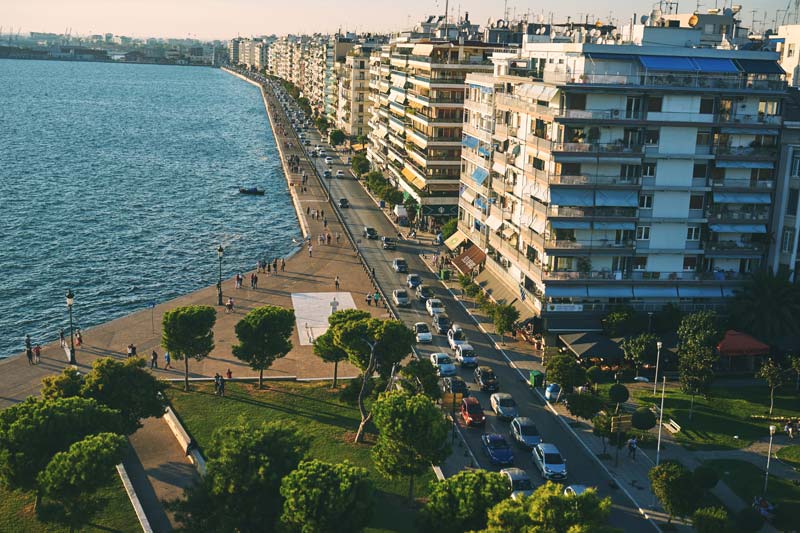
The advantages of buying a house in Thessaloniki:
- Emerging market potential: Greece’s second largest city is experiencing growth in its real estate market, with opportunities for capital appreciation as it becomes more internationally recognized
- Cultural and educational hub: Home to numerous universities and cultural festivals, Thessaloniki has a constant demand for housing, supporting both the rental and resale markets
- Strategic Location: Its position as a gateway to the Balkans and proximity to popular tourist destinations increases its appeal to investors looking for properties with high occupancy rates
- Regeneration projects: Significant investment in waterfront and city center regeneration projects is increasing property values and attracting international interest
- Emerging Tech Hub: Rapidly becoming a hub for start-ups and technology innovation, providing new employment opportunities and a vibrant community for professionals
- Cost of Living: Generally lower than Athens, making it an attractive option for those seeking a more affordable lifestyle without sacrificing amenities
Patras
A bustling port city with a youthful atmosphere, Patras is the third largest city in Greece.
It has seen a renewed focus on infrastructure development and urban revitalization.
The construction of the Rio-Antirrio Bridge, one of the longest cable-stayed bridges in the world, has improved connectivity with the mainland, making Patras a more accessible destination. At the same time, investments in the modernization of the waterfront, with promenades, parks and recreational facilities, have revitalized the city’s coastal appeal.
Recently, Patras has experienced a more urban real estate development. There has been a surge in new residential projects aimed at rejuvenating the city’s older areas and accommodating its growing population.
The city’s status as an educational and commercial center makes it attractive to both domestic and international investors.
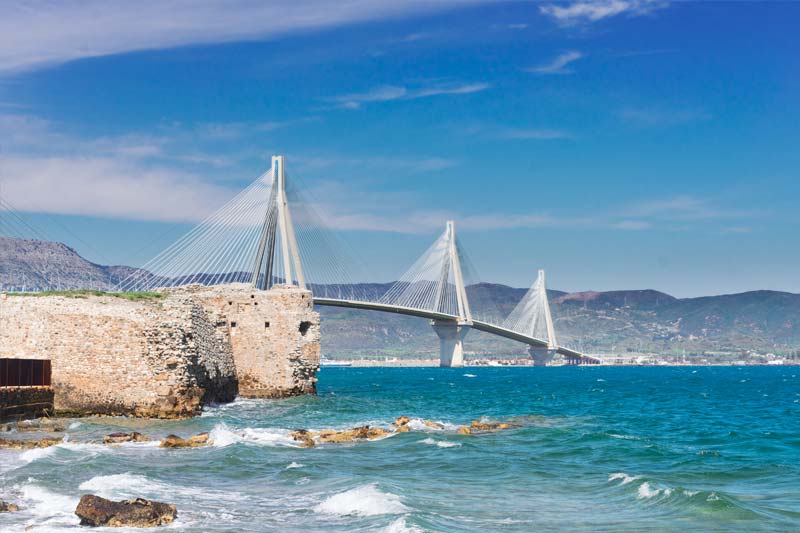
The advantages of buying a house in Patras:
- Affordability: Compared to Athens and Thessaloniki, Patras offers more affordable real estate options, providing a lower entry point for investment
- R&D and Innovation Hub: The presence of research institutions and technology parks contributes to the demand for housing by professionals and academics.
- Business and Educational Center: Home to one of Greece’s largest universities and a vibrant student population
- Ideal for business and leisure travel: The Port of Patras provides easy access to the Ionian Islands and Italy, making it ideal for business and leisure travel
- Wine Region: Surrounded by some of the most important wine-producing areas in Greece, perfect for aficionados of vineyard tours and wine tasting
Crete
The largest of the Greek islands, Crete is considered a very attractive destination and has seen significant investment in its tourism infrastructure. The island now offers a more diverse range of accommodation, from boutique hotels to luxury resorts, to suit all tastes and budgets.
One of the most significant developments has been the expansion and improvement of transportation links. Upgrades to airports and the construction of new ports have made it easier for visitors to reach the island, increasing the number of tourists.
As a result, Crete has seen a significant increase in demand for real estate, vacation homes and retirement properties, especially in coastal areas and near major cities such as Chania and Heraklion.
This surge in interest has led to the development of new residential projects, including luxury villas and condominiums, especially in areas close to the coast.
The rise of remote working trends has also made Crete a popular destination for digital nomads seeking a mix of work and play in a picturesque setting, contributing to a vibrant real estate market.
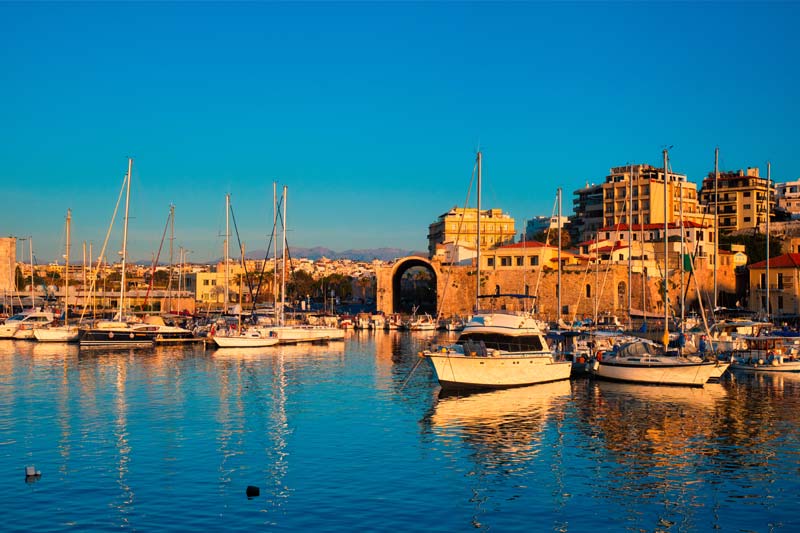
The advantages of buying a house in Crete:
- Natural beauty and climate: Offers some of Greece’s most stunning scenery, from pristine beaches to rugged mountains, along with a year-round mild climate
- Growing expat community: The island’s large size and diverse regions have attracted a significant expat community, facilitating a smoother integration for newcomers
- Tourism investment opportunities: With its booming tourism sector, owning property here can offer lucrative rental opportunities and a steady demand for vacation rentals
- Expanding Infrastructure: Investments in infrastructure, including airport expansions and road improvements, are increasing accessibility and property values
- Diverse real estate market: Offers a wide range of properties, from beachfront villas to traditional Cretan houses, suitable for a variety of investment levels
Corfu
Corfu, a lush Ionian island known for its stunning scenery and Venetian-influenced architecture, is famous for its blend of beautiful beaches, historic sites and vibrant cultural life.
Over the years it has seen remarkable changes in its real estate market, with an increase in demand for properties, especially from foreign buyers looking for holiday homes or investment opportunities.
Property prices in Corfu have been rising steadily, but still offer value for money compared to other popular Mediterranean destinations. The northeastern part of the island in particular is known for its luxury properties and upscale developments.
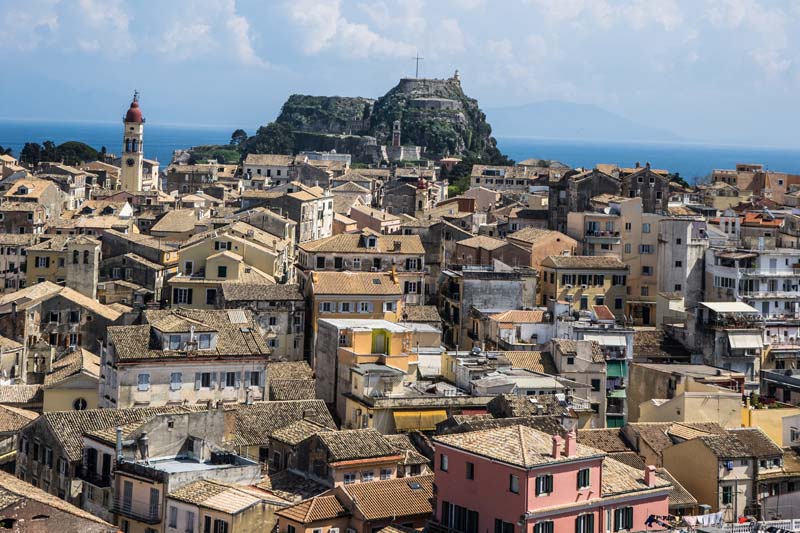
The advantages of buying a house in Corfu:
- UNESCO World Heritage Sites: The old town of Corfu is a UNESCO World Heritage Site, offering a beautiful and historically rich environment in which to live
- Strong rental market: Popular with tourists, owning property in Corfu can be a good investment, especially for short-term vacation rentals
- International community: Hosts a significant number of international residents and tourists, making it an easy place to adapt and find a community
Rhodes
Rhodes, the largest of the Dodecanese islands, offers a mix of medieval architecture (such as the medieval Old Town of Rhodes, a UNESCO World Heritage Site), beautiful beaches and modern amenities. The island has always been a magnet for tourists and property seekers alike.
Like others, Rhodes has seen a steady growth in its real estate market, with increased interest from foreign buyers, particularly for luxury properties and vacation homes.
The Rhodes market is characterized by a mix of traditional Greek houses and modern villas, with a growing trend towards high-end amenities.
There is a trend towards renovating older properties in the old town as well as developing new, modern residences along the coast.
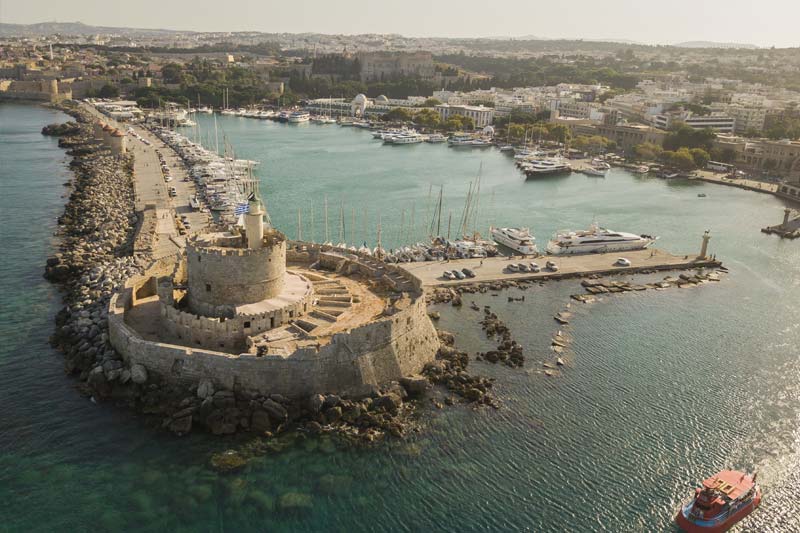
The advantages of buying a house in Rhodes:
- Climate and Lifestyle: The sunny climate and high quality of life make it an attractive location for both short-term and long-term living
- Historical heritage: The island is home to one of the best preserved medieval cities in Europe, offering a unique living experience surrounded by history
- Strong tourism sector: A popular destination for international visitors, offering investment opportunities in the hospitality and real estate sectors
- Modern amenities: Offers the relaxed island lifestyle while providing all the necessary modern amenities, including an international airport
Kefalonia
Kefalonia is known for its stunning natural beauty, including dramatic mountain landscapes and crystal clear waters. The island’s appeal is rooted in its tranquil surroundings, picturesque villages and beautiful beaches, making it an ideal location for those seeking a quieter lifestyle.
As the largest of the Ionian Islands, it has increasingly attracted the attention of international buyers looking for holiday homes or permanent residences.
The real estate market in Kefalonia offers a range of properties, from traditional stone houses in rural areas to contemporary villas with panoramic sea views away from the more crowded tourist spots.
While property prices in Kefalonia are generally more affordable than some of the other Greek islands, there has been a steady increase in value reflecting the growing interest.
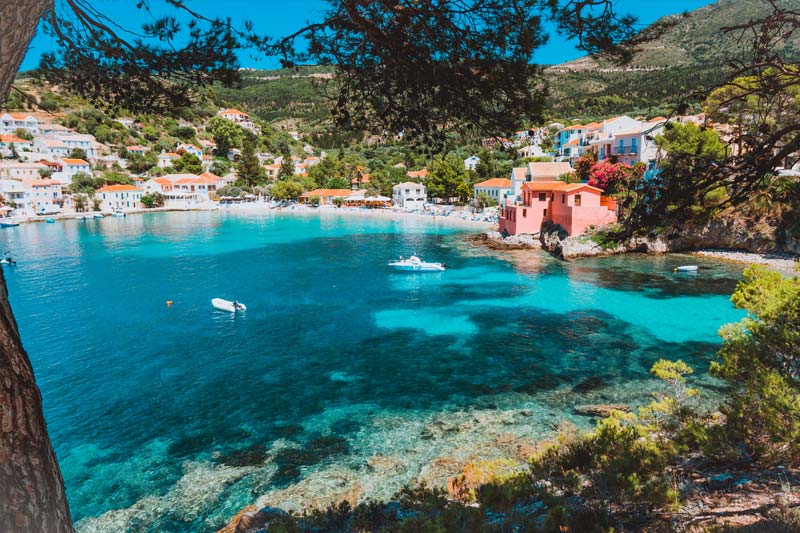
The advantages of buying a house in Kefalonia:
- Emerging market: Kefalonia is less developed than some other Greek destinations, offering growth potential in its real estate market
- Low density: With stricter building regulations than other destinations, Kefalonia offers a more exclusive real estate market with less risk of oversupply
- Quality of life: The tranquil lifestyle, combined with the island’s natural beauty, appeals to those looking for a second home or retirement property, ensuring a demand for high quality real estate
- Investment potential: The island’s growing popularity among tourists and limited real estate development create potential for property appreciation and rental income
How We Can Help You Buy Your Property in Greece
Navigating the complexities of buying property in Greece doesn’t have to be a solo venture – contact Leptokaridou Law Firm today, we’re here to help!
As experienced Greek legal real estate professionals, we offer an end-to-end service that turns this complicated process into a smooth operation. You will have a trusted lawyer by your side at every step of the process, from the initial negotiations to the final signing of the contract.
You will always feel protected, even if you don’t speak Greek, when you are faced with misunderstandings, cultural barriers and when you have to deal with unexpected contingencies and complications. We will be with you to make every situation easier.
Contact us immediately if you are planning to buy property in Greece, you will be taking the right first step towards securing your strategic real estate investment.
FAQ
People interested in buying a house in Greece often ask us some of these questions, so we decided to include the answers here.
Can a foreigner buy a house in Greece?
Yes, foreigners can buy a house in Greece. The process for foreign buyers is fairly straightforward, especially for EU citizens.
Non-EU citizens are also able to purchase property, although they may face additional steps or requirements, especially if the property is located in border areas where special permits may be required. In fact, Greece has become a very popular destination for foreign real estate investment, thanks in part to its Golden Visa program, which offers residency permits to non-EU investors who meet certain investment thresholds.
Can you live in Greece when you buy a house?
Buying a house in Greece does not automatically grant residency rights.
However, for non-EU citizens, purchasing property can be a pathway to obtaining residency through the Golden Visa program. This program requires a minimum investment in real estate (the threshold has varied but has been around 250,000 euros or 500,000 euros, depending on the location of the property).
Once you receive this visa, you and your family can live in Greece. Note that this residence permit does not grant the right to work in Greece and must be renewed every five years, but it does allow free movement within the Schengen zone.
Is it easy to buy property in Greece?
With the right preparation and professional assistance, the process of buying property in Greece can be relatively straightforward.
Of course, the language barrier and additional legal and financial considerations, such as obtaining a Greek tax number (AFM) and opening a local bank account, can make the process more complex for foreigners without the right assistance. Hiring a local real estate agent and a lawyer experienced in real estate transactions is key to ensuring a smooth purchase and navigating any complexities with ease.
Is it cheap to buy property in Greece?
Buying property in Greece used to be considered relatively cheap, especially during the economic crisis of the late 2000s and early 2010s. However, prices have recovered across Greece and especially in popular areas such as Athens and in locations with high tourist demand.
Nevertheless, today real estate prices in Greece can still be relatively lower compared to many other European countries, especially in rural areas and less popular islands in general, which offer more affordable options.
Can Indians buy property in Greece?
Yes, Indian citizens can buy property in Greece.
The process and requirements are the same as for other non-EU citizens.
Indian buyers can also take advantage of the Greek Golden Visa program, which grants residency in Greece for significant real estate investments. This can be an attractive option for Indians seeking residency in the European Union.
* The information on this site is provided for the sole purpose of illustrating the subject matter. It in no way constitutes legal advice nor a substitute for individual legal advice provided by counsel. Each case is unique, presents unique circumstances, and should be evaluated in detail by an attorney who will verify its specific circumstances.
Contact Leptokaridou Law Firm
Buy a House in Greece Safely
Buying a house in Greece is an important and wonderful step! Contact us today to protect your investment, and don’t let any setback ruin your dream.
Contact us if you are in the process of buying a house in Greece.
Thessaloniki
+30 2310 284408
Berlin
+49 30 88702382
We Help You Buy a House in Greece
An international lawyer experienced in Greek real estate law is your ideal partner when buying a home in Greece. We will be by your side to ensure that the process goes smoothly.




